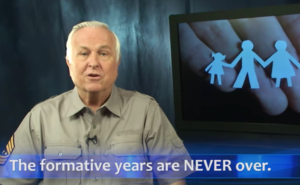Josh McDowell's Blog, page 25
June 18, 2019
Parents: 5 Delusions That Hurt Your Relationship With Your Kids
√ An important take-away: As parents, we can’t give what we don’t have, right? If you need to grow your parenting skills, we have some really fab, FREE parenting resources for you at the bottom of this post!
Parent Delusion #1: Quality Over Quantity
My son turned ten just the other day. He said, “Thanks for the ball, dad, come on let’s play. Can you teach me to throw?” I said, “Not today, I got a lot to do.” He said, “That’s ok.” And he walked away, but his smile never dimmed. Said, “I’m gonna be like him, yeah. You know I’m gonna be like him.” **
It’s just not true that kids benefit most from occasional blocks of “quality” time with a parent. In truth, it’s the small, daily, teachable moments that help to cement a deepening connection between two people, especially a parent and child.
Consistent, positive interaction, based on an open channel of communication, builds a strong foundation of trust that will enable you to keep a connection during even the rocky moments of your relationship.
** Song lyric: Cat’s in the Cradle, by 1970s American songwriter Harry Chapin. Watch Josh’s video here.
Parent Delusion #2: It’s the Big Moments That Matter Most
Big moments are great — if they’re balanced by the everyday small ones. No doubt about it, kids love trips to Disney World. But what matters more is that you’re intentionally experiencing it with them. Your children will remember a few highlights from the big moments and vacations, but it will be the cumulative build of your joint small, routine moments that will mold their character.
Parents, God has given YOU the privilege of playing a significant role here. Relish the trust He has placed in YOU! Watch Josh’s video here.
The big moments are important, but it’s usually not the big moments that mold a child’s life. ~ Josh
Parent Delusion #3: The Early “Formative” Years Matter Most
Yes, a child’s early years matter. Greatly. But your children also desperately need your time, love, and guidance during their challenging teen years. Even when it appears that your teenagers aren’t listening. Because they are. Think back on your own teen years!
Your kids just want to know that they can trust you with their worries and fears and weaknesses before they lower their guard enough to share them. Be a safe haven for your kids, as you rely on God’s Word to strengthen and guide them. And never stop praying for them! Watch Josh’s video here.
Your children need you as much as teens as they do when they’re younger. ~ Josh
Parent Delusion #4: Work Now, Play Later“But I just don’t have the time right now!” is just an excuse. Really. Because we all know, deep down, that we give time to what we DECIDE to give time to. Your children get this message loud and clear!
Yes, life gets busy. And yes, it’s important to provide financially for our families. But we must be super aware that it is the relationships we have with our spouse and kids that God expects us to make our main priority. Josh had to keep this in mind himself, during his busy travel schedule over the years. We can’t get back lost time. So to enjoy quality relationships with our kids down the road, we must make consistent investment in them now.
A perfect analogy: a lush lawn. How do we grow and maintain a front lawn that makes our neighbors green with envy? By diligently and consistently adding what our grass needs to thrive: sunlight, water, weeding, and even fertilizer. When we don’t, our grass is quick to evidence our neglect. Watch Josh’s video here.
“Make the priority for your family so obvious that it motivates others to have the same.” ~ Josh
Parent Delusion #5: God’s Grace Will Cover My Mistakes
I’ve long since retired and my son’s moved away. I called him up just the other day. I said, “I’d like to see you if you don’t mind.” He said, “I’d love to, dad, if I could find the time. You see, my new job’s a hassle, and the kid’s got the flu, but it’s sure nice talking to you, dad. It’s been sure nice talking to you.” **
All parents make mistakes. Because they’re human. God continually offers to forgive those mistakes, because His love is that big and gracious. But the hurt we cause to our families via our words and actions has consequences. The hurt doesn’t go away unless we address it — ask for forgiveness — and commit to restoring the relationship. God is pleased with our efforts to bring our best selves!
** Song lyric: Cat’s in the Cradle, by 1970s American songwriter Harry Chapin. Watch Josh’s video here.
√ CLICK HERE to view all of Josh’s parenting videos.
√ Click HERE to view Josh’s Father Factor report.In our next blog post, let’s look at Ashley’s post on maintaining healthy relationships.
Catch up: The introductory post to this series.
The post Parents: 5 Delusions That Hurt Your Relationship With Your Kids appeared first on Josh.org.
June 12, 2019
Josh’s Special Message to Dads

Click to watch video
Happy Dad’s Day!
Are you aware that the latest research, say in about the last 10 to 15 years, has reversed 300 years of thinking? We used to say that moms were the more critical caregiver as kids were growing up. But researchers now say that dads can have just as much influence, if both parents have an equal relationship with their child. It’s when a dad doesn’t develop that relationship that his influence drops significantly below that of the mom.
Dads, do you want to have a relationship of influence with your children? Follow these three keys!
First Key: Model God’s TruthAs you talk to your kids about God, you actually become God to them. As God would say, “You look at me all together as you look at yourselves.” So we dads need to make our faith desirable to our children!
One of the most marvelous things any of my kids ever said or wrote to me was at a fundraiser we were doing in Carlsbad, California. My daughter Heather was going from Biola University to Mexico, to work at an orphanage. She stopped by the fundraiser, but before the end of my second talk she had to leave. So she wrote a note and left it on the table. When I finished speaking, I went over and read it. My daughter had written, “Daddy, did you know that when I was a little girl, I always wanted Jesus to be just like you?” I couldn’t hold it; I cried in front of everyone!
Second Key: Focus on Building RelationshipDads, rules without relationship lead to rebellion. Truth without relationship leads to rejection.
Kids respond to rules and truth in a context of a loving, intimate relationship. Have you tried grace-filled parenting?
Third Key: Don’t Just Talk, Learn to ListenDads, listen, listen, listen — and then ask questions.
And when your kids answer your questions, don’t be correcting them. Just listen, then follow their answer with another question, and then another question. An important question: how well do you know your child?
By learning to actively listen to what you kids are telling you, you will create a two-way dialogue that will keep communication flowing.
Dads, be encouraged! If you focus on these keys, you will positively impact your children!
Josh
P.S. Want to know my 7 A’s of Parenting? I’ve made a bunch of short videos in which I share these valuable parenting tips I learned over the years with my own kids. My seven tips cover the topics of Affirmation, Acceptance, Appreciation, Availability, Affection, Approach Their World, and Accountability. Check them out!
I also encourage you to peruse our Youth & Family Resources page and the Father Factor report on our Research page. Dads, we’re here to support you!
In our next post in the Journey Together series, let’s talk about the transformational power of relationships, and how they create a strong foundation for our kids.
Catch up: The introductory post to the Journey Together series.
The post Josh’s Special Message to Dads appeared first on Josh.org.
June 2, 2019
Alex’s Special Message About Fathers
Hi, I’m Alex McLellan with Josh McDowell Ministry. I was three years old when my non-Christian parents got divorced, and my sister and I went to live with my mother. For the next six years, Happy Father’s Day wasn’t so happy. I’ve shared many times that my parents eventually became Christians and got remarried — to each other! However, as wonderful as it was to again have my dad in my life, I couldn’t get those years back. For six years, six important years, I grew up with a distant dad.
Can Our View of Our Earthly Father Skew Our View of God?
I understand why people carry the dysfunction of their family into the future, carry the dysfunction of an earthly father into their relationship with God — our loving Heavenly Father.
However, I didn’t grow up thinking my Heavenly Father would also leave me or keep His distance. Instead, I only knew any shortcoming of my earthly father was a shortcoming because I had a deeper sense of the way things ought to be — the way a father ought to be.
I carried this understanding into my relationship with my Heavenly Father, knowing He would be the ultimate father I was looking for, the kind who would never leave or let me down. The Bible says our Heavenly Father is the only one who meets the ultimate standard — because He is the standard!
On Father’s Day, I’m so thankful for my earthly father. He was a wonderful man who brought so much into my life. But he wasn’t there for me the way God always is. I don’t know what kind of father you have, but you, too, need to know that your Heavenly Father is the only father who will never leave you or let you down.
Because of this truth, we all can say, “Happy Father’s Day!”
Alex
P.S. Are you a parent? We have two free resources for YOU!
Josh has spoken to over 25 million people in 125 countries. He has spent years researching and teaching on the role of fatherhood. His research, which we’ve compiled into a report titled The Father Factor, is our free gift to you. It will give you tools you need to build loving and lasting relationships with your children. It will strengthen the foundation for your family. Read the report now!
And Josh has recorded short parenting videos in which he shares with you the valuable tips he learned while parenting his own kids. Josh’s seven tips cover the topics of Affirmation, Acceptance, Appreciation, Availability, Affection, Approach Their World, and Accountability. Check out the videos!
In our next post in this Journey Together series, Josh shares a special Father’s Day message with you!
Catch up: The introductory post to the Journey Together series.
The post Alex’s Special Message About Fathers appeared first on Josh.org.
May 27, 2019
Rethinking Accountability: A Proactive & Healing Approach Part 2
We live in a world full of stress, hurt, and things that were not meant to be. Regardless of our particular struggles, we all develop ways of dealing with stress and pain in our life — often through unhealthy choices. As I shared in my last blog post, I developed a number of compulsive behaviors to protect myself and cope with life. My addiction to food, constant fear and control, porn, and anger helped me to survive the chaos of life.
What are your coping mechanisms? Overwhelming fear? Binging on video games or Netflix? Excessive drinking? Control? Perfectionism? Overworking? Focusing too much on what you look like? The list seems endless, right?
Through identifying our specific unwanted behaviors and why we run to them, we can take steps to surrender them to Jesus. He desires to bring us healing, freedom, and to always meet our needs (Psalm 14:16). Let me share one tip for how I found freedom from my old destructive coping mechanisms.

Choosing to Be Proactive
As I said in Part 1 of this post, I truly believe that instead of accountability we need proactive and healing support.
This support incorporates assessing the precursors, stressors, emotions, and situations that tend to occur before we end up in our unwanted behaviors. This support involves creating a plan of action with safe people. It’s asking trusted friends to encourage us, and support us with specific challenges we are facing throughout the week. It’s knowing that with them, we won’t face condemnation but will be met with grace and truth. This support is about inviting others to help us understand why we do what we do, and to help us process the difficulties in life that trigger us to cope.
This type of support requires a proactive, daily choice. Trust me, I know this first-hand.
In 1 John 1:7, we are instructed to walk in the light, having fellowship with others and being cleansed from all sin by Jesus.
Walking in the light is a daily lifestyle of being fully transparent with Jesus and these safe people about our emotional well-being and struggles.
Click To Tweet
We do not just let go and let God. We have been given an active role to play in addressing issues in our lives...
Click To Tweet
We do not just “let go and let God.” We have been given an active role to play in addressing issues in our lives through the power of the Holy Spirit (Romans 8:13). As we confess our sins to God and one another, sharing our hurts and struggles and asking for help, the Holy Spirit brings about growth and healing in our lives.
Why Proactive Healing Support Works
Proactive and healing support is not about behavior modification.
It is about inviting God and others to be part of healing the underlying hurts and unresolved areas of our stories that we’d rather avoid.
It’s easier to blame our sinful nature than to admit that we may be carrying hurt and unresolved shame that keeps us returning to unhealthy patterns. Click To Tweet
Proactive and healing support is also not limited to simply talking about sin or unhealthy choices in our lives.
It’s a daily lifestyle of reaching out for help to process the pain and stress in life that often influences the ways we cope. We must understand that our sin and unhealthy choices are not random. We sin because we are sinful, but we also sin because we have been sinned against and have developed ways to cope when that past pain gets triggered.
Through being proactive and gaining healing support, Jesus matures us into who He created us to be.
When we stop fighting the wrong battles and start implementing proactive and healing support, we can invite Jesus to do His greatest work in the rich soil through which He has designed healing and growth to take place. He helps us to overcome struggles and our unwanted behaviors. I know because He’s done it with me.
Take This Next Step
As uncomfortable as it can be, I encourage you to ask a couple of trusted friends to live a lifestyle of proactive and healing support with you. Commit to reaching out to each other throughout the week. Together, begin to identify the stressors and patterns that lead you each to make unhealthy choices.
I might suggest that you and the safe people in your life also study The Faster Scale, a tool designed by Christian counselor Michael Dye, to stay aware of your emotional state and see temptation coming before it arrives. “FASTER” is an acronym for Forgetting Priorities, Anxiety, Speeding Up, Ticked Off, Exhausted, and Relapse. The Scale is really helpful.
The post Rethinking Accountability: A Proactive & Healing Approach Part 2 appeared first on Josh.org.
Rethinking Accountability: A Proactive & Healing Approach Part 1

What Is Biblical “Accountability”?
We throw the word “accountability” around frequently. We often use it in the context of one person asking another to make sure they do (or don’t do) something. The English word closest to “accountability” is “responsibility.” Think about that. When we ask others to hold us accountable, we’re asking them to be responsible. To help us to not return to unhealthy choices — or to follow through on healthy commitments, such as reading our Bible or loving others better.
But in the Bible, the word closest to accountability is “account.” The mentions of “account” have to do with someone giving an “account” of oneself to God (Romans 14:12, Matthew 12:36, Hebrews 4:13, Hebrews 4:17, 1 Peter 4:5). What the Bible is saying is that it is up to each of us, as individuals, to be accountable to God for our choices. It is not another person’s responsibility to hold us accountable. We each need to follow through and partner with God as He develops healthy desires and abilities within us.
A more accurate word for what we are designed to have may be “support”.
We need one another, not to hold us responsible or accountable, but to help support us daily.
Click To Tweet
Some may argue this is semantics, but I think this is one reason why “accountability” is often reactive, unhealthy, and limiting to our growth.
Where Do We Find Healing?
Proactive and healing support involves a daily choice of reaching out for help, within a safe community, to process the pain and stresses that drive our thinking and behaviors. We have to recognize that we don’t just end up back in our unhealthy choices at the drop of a hat. We go through recurring patterns and cycles before ending back in the places we swore we’d never go again.
We begin to react to challenges, criticism, stress, and start believing lies and feeling emotions like anger, sadness, or fear. We then begin thinking of ways to cope with or escape these emotions. Often, these cycles of trigger and response operate at a subconscious level. They have been ingrained in us, leading to fixed brain pathways that we must intentionally renew.
What we need is help in these moments when our reactive thinking and emotions begin. We need support, encouragement, help, and love, to grow and overcome unhealthy choices. Fortunately, God has given us an incredible gift through the body of Christ to do life together in a much deeper way than we often do.
Healing begins for us when we develop a lifestyle of reaching out rather than acting out.
Click To Tweet
Safe Support Jumpstarts Our Healing
We have the option of experiencing health and healing as we live openly with safe people. Doing so helps us to understand why we return to destructive behaviors, and to steer ourselves well to prevent future harmful choices. Again, healing begins for us when we develop a lifestyle of reaching out rather than acting out.
I stayed trapped, for years, in porn addiction, a food addiction, deep anger, and a multitude of other struggles, as I practiced reactive and unhealthy accountability rather than proactive and healing support.
Sure, I had Internet-filtering software on my devices and an “accountability partner,” but this often just resulted in a weekly meeting with a friend to confess my slip-ups after living in isolation for another week. The conversation frequently ended with my futile commitment to try harder to not sin. Yes, it was a great start to confess my sin to others (as we are told to do in James 5:16), but I was seriously limiting my growth with only having those weekly interactions to help me gain healing.
When we try to stop unhealthy choices without first uncovering the why behind our actions, our growth is severely limited.
Click To Tweet
Too, I was fighting the wrong battles. I focused primarily on my behavior and sin avoidance, rather than seeking healing and support for the underlying shame, emotional wounds, and unresolved areas in my life that had set me up to cope. To overcome these, I had to invite Jesus and others in every day to help me understand why I struggled and to understand the unresolved areas of my heart and mind that needed healing. Only then could I stop living reactively and experience healing and fulfillment. So rather than just confessing my anger to my “accountability partner,” I began seeking proactive and healing support for my anger.
In doing so I discovered that my anger was fueled by the deep, gnawing fear that grew out of my experiencing frequent rejection by friends and family as a kid. As many of us do, I learned to protect myself with anger. As an adult, my lashing out got even worse. My simply trying harder to stop being angry only intensified my struggle.
Allowing Jesus to Partner With Us
To address the fears behind my anger and self protection, I had to allow the truth of who Jesus says I am to affect my thinking. As I began to trust His Word as I reached out to others to help me process my anger, it finally began to calm down. As I was freed up to be more centered and less reactive, I was able to love others better and let them in.
I had to take it all -- my hurt, secrets, sin, and negative thoughts -- to Jesus and others to gain wisdom, understanding, and experience growth.
Click To Tweet
When we invite Jesus and others in to help us, encourage us, and do life together, we can begin to understand our reactionary patterns of thinking and acting that set us up to return to unhealthy choices.
The healing and freedom we so desperately want and need is possible. It starts with safe, proactive, healing support — and the anticipation that Jesus can heal us, set us free, and help us to live the thriving life He created us for.
Let’s rethink the accountability mentality as we seek proactive and healing support. Let’s shift our focus to owning our growth and partnering with God to experience healing and freedom. Stay tuned for part two of this post for practical steps to implement proactive and healing support.
The post Rethinking Accountability: A Proactive & Healing Approach Part 1 appeared first on Josh.org.
May 21, 2019
Five Truths to Know About Mental Health
In recent years, mental health issues have risen among young people. In fact, seventy percent of teens say anxiety and depression are major problems among their peers. (1) Between 2007 and 2015, emergency room visits for suicidal thoughts and attempted suicide doubled among children and teens. (2) Clearly, we are living in a chaotic time of loneliness, hurt, and struggles.

I personally experienced mental health issues for years. By the age of eight, I was riddled with anger, feelings of worthlessness, depression, and anxiety. When I developed Obsessive Compulsive Disorder (OCD), I felt that life had become close to unbearable.
I began to doubt that God existed, and I feared that He would reject me when I died. For almost a decade I obsessed about going to hell, sometimes praying upwards of twenty times a day that Jesus would save my soul. I began to wish that I had never been born, because that would have been easier than the torture and fear I experienced on a daily basis. I was caught in a brutal, hopeless, obsessive cycle of fear.
At times, I could barely sleep for days due to the intensity of my anxiety. Other times, I felt deep sorrow for seemingly no reason. To try to put this into words, the grief I felt was on par with what I think it’d be like to lose all of my close friends to a tragic accident, and the concepts of hope and happiness no longer existed. My emotional pain was so drastic at times that I feared I’d attempt suicide.
Throughout my years of battling mental health issues, I wish I had known the five key truths I share with you in this post. Whether you or someone you know is facing mental health issues, I hope these truths bring you deeper understanding and hope.
1. Nothing Is “Wrong” With You
It’s easy to think you got the shaft in life, that you just got dealt a bad hand, or that there is something faulty with you. We often buy into shame or the belief that something is wrong with who we are. This often only further reinforces our struggles with mental health issues, leading to greater hopelessness. But we must remember that our identity does not lie in our status, emotions, achievements, or struggles, but in who God says we are. We are not defined by our struggles. We are defined by our identity as human beings made in the image of God. We are defined by the radical love Jesus has for us.
We must remember that our identity does not lie in our status, emotions, achievements, or struggles, but in who God says we are.
Click To Tweet
2. It’s Ok to Seek Professional Help and Take Medication
The fields of psychology and medicine are gifts from God to us. When we are physically ill, we often have no qualms about going to the doctor. When we break a bone, we are quick to visit the emergency room to get help. So why is it often seen as taboo or a weakness when we seek help for our mental health? Be wary of those who over-spiritualize solutions to mental illness. God can heal through supernatural means, but He also provides help and healing through psychology and medicine. Even the Apostle Paul encouraged Timothy to seek a type of medication for his stomach ailment in wine (1 Timothy 5:23).
Be wary of those who over-spiritualize solutions to mental illness. God can heal through supernatural means, but He also provides help and healing through psychology and medicine.
Click To Tweet
3. Often, Mental Health Issues Aren’t Random
While I’m not a mental health counselor, and psychologists aren’t fully in agreement on any one cause of mental health issues, many times these issues are developed as a result of painful or stressful experiences. (3)(4) This was the case in my own life and in the lives of others I’ve led through support groups. When we started to understand what we had been through in life, we realized that our mental health issues weren’t random. These issues were developed as coping mechanisms to survive turbulent times of hardship. Our brains were literally rewired to manage the stresses and pain we experienced. Because of that, we continued to have similar responses to new stressful situations that came up.
4. Understanding Triggers Can Lead to Transformation
Mental health issues actually serve an important purpose in our life. In my life, anxiety serves me by attempting to protect me from feeling unsafe and rejected. Anxiety can be brought on in a moment by the thought of loss, failure, or embarrassment and spiral out of control. Depression can creep up after experiencing rejection from someone or feeling hopeless about life circumstances. We can find understanding as we identify the fears, stresses, and particular situations that trigger our struggles. We often have situations in life that trigger, or bring on, more intense mental health episodes. But we can experience transformation as we challenge those fears and lies we may be believing about what is true of us.
5. It Gets Better and Can Be Overcome
As I shared earlier, for years I was crippled by anxiety, depression, Tourettes, ADHD, OCD, and other mental health issues. Most of these are now minimal issues in my life as I’ve worked through extensive therapy to identify the triggers, understand and challenge the lies, and invite Jesus and others to be part of my healing journey. Through many experiences with God and others I’ve now started to believe more and more the truth that I’m accepted, not rejected.
I’ve had new experiences of challenging these triggers and lies, rather than throwing in the towel and letting the anxiety, depression, and obsessions run wild. As we make the conscious decision to wire out old patterns of thinking and respond to lies with truth, we can be transformed by the renewing of our minds, as Romans 12:2 says. We can create new default brain pathways of responding to stress, pain, and difficulties in life that allows life to get easier to handle.
As we make the conscious decision to wire out old patterns of thinking and respond to lies with truth, we can be transformed by the renewing of our minds as Romans 12:2 says.
Click To Tweet
If you or someone you know is struggling with mental health, check out josh.org/counseling for professional resources. Also, check out the FASTER Scale to consider how circumstances and challenges in your life may be triggering your struggles.
The post Five Truths to Know About Mental Health appeared first on Josh.org.
May 15, 2019
Find Confidence In Being Authentic
Which of your quirks do you doubt God could possibly love — or even like about you? Here's the truth: every bit of YOU reflects an important aspect of God’s nature.
Click To Tweet
Look With the Right Perspective
How can I put this? Hmmm…some of us are totally faking it. Others of us know who we are, but we keep our authentic selves hidden. Often because of fear of rejection. But to fully experience and share God’s love and grace, we must get to where we can embrace our whole package — what we self-judge to be the good, the bad, and the ugly. #shudder #ugh #butiamsobad
Here’s the truth: God loves every bit of our quirky selves! Because LOVE is central to what being a Christian is really all about! You and I are here to 1) LOVE God, and 2) LOVE others. Neither of which we can fully do if we’re wasting time fighting who He made us to be to reflect His love.
As John Eldredge says in his book Waking the Dead: The Glory of a Heart Fully Alive, “You cannot love another person from a false self. You cannot love another while you are still hiding. How can you help them to freedom while you remain captive? You cannot love another unless you offer your heart.”
Ah, you’re thinking, but I’ve learned to hide my heart. Because it hurts too much when others tell me I’m not good enough as I am.
Ask the Right Question
What if, instead of beating ourselves up and asking, “How can I empty myself of the quirks I despise to be more like God?” we’re supposed to ask, “How can I reveal God to others THROUGH the quirky bits He included in my personality?”
Here’s a thought:
Maybe the brashness you hate in yourself is actually courage.
Maybe the loudness you hate in yourself is actually courage.
Maybe your tendency of being a bull in a china shop is actually courage.
Or could be, if you weren’t too busy hiding your authentic self…
Too often we dislike… despise… hate… parts of ourselves when we shouldn’t!
The million-dollar question: Who told us to not embrace and appreciate these parts of ourself?
In my case, it was my mom. Oh. My. Word. If I had just recognized early on that all the criticism my mother directed at my loud, brash self as a kid and teen was her issue — not mine — I wouldn’t still, at moments, battle the meanie in my head that tells me I need to rip out those aspects of myself.
CAN YOU RELATE???
God Designed Your Quirks
I love how speaker and life coach Laurie Wallin, in her book Why Your Weirdness is Wonderful, says, “Insecurity happens when we’re trying to live someone else’s quirks. Borrowed weirdness can’t work wonderfully in us because it’s meant for someone else.”
I accept that my mom did the best she could. Loud noises undid her. High energy undid her. But rather than taking the time to help me to still feel good about my naturally loud bent, her response to me led me to believe that I was defective. Definitely unaccepted. And iffy on being lovable. I went from being a confident kid to a shy kid even too timid to voice an opinion. I became a people pleaser to the max. All day long I changed like a chameleon, giving people whatever color of me they wanted me to be so I would feel momentarily good about myself. But inside I was a depressed and often angry mess.
What I didn’t realize as a child and teen is that I have a God-given right to embrace my “weirdness” — to know that even if others don’t appreciate my quirks, God does! As Laurie puts it so well, “God didn’t give us our gifts to paint them over with someone else’s. The unique tendencies in you and me are meant to shine in a hue all their own, and in doing so, bring a little more clarity to the full-color beauty of the God we reveal to the world.”
God says He FULLY loves and accepts us as we are.
God KNEW what He was doing when He designed us.
God DESIGNED us to add our authentic selves to the world.
As we mirror God, our quirks should REFLECT His goodness.
God Wants to Make Us Fruity
We NEED to bring our authentic selves to life, because God wants to make us into an enticing fruit salad that feeds others. Yup, I’m talking about our reflecting the fruit of the Spirit. Listen, how we react and relate to others is DIRECTLY tied to how we view (and talk to) ourselves. How can we bring love, joy, peace, forbearance, kindness, goodness, faithfulness, gentleness and self-control to others, if we feel that we can’t be our quirky selves and be “acceptable” to God or others?
It’s important that I note that because I hadn’t accepted myself like God does, I developed some very bad habits. Including lashing out at others with anger or sarcasm when I felt I was being mocked or controlled or unloved. Can you relate??? It’s so easy to get in the habit of misusing a strength — perhaps displaying it as unkindness or impatience or arrogance — until we seek after God and partner with Him to become whole and fruity.
It can hurt a lot as He slices and dices us into those mouth-watering bits of melon and kiwi and pineapple. But the satisfying part of this growth process is seeing what we perceive to be a weakness become a strength in His hands! God wants to use our messy selves, just as we are. He’s perfectly fine with us being “in process”! What God seeks at all times are willing, authentic people.
Being authentic takes guts. But which is better? Hiding or hating your true self, or finally saying to the world, God made all of me for His glory and His purposes!
Click To Tweet
In our next blog post, let’s look at how God models the perfect parenting relationship. For sure, you can’t be the best parent you can be if you haven’t learned to appreciate all of your quirks!
Catch up: The introductory post to this series.
The post Find Confidence In Being Authentic appeared first on Josh.org.
May 12, 2019
Self-Image: See Yourself as God Sees You
 Welcome to another post in our new year-long blog series, “Journey Together,” where we answer questions about God, relationships, and life!
Welcome to another post in our new year-long blog series, “Journey Together,” where we answer questions about God, relationships, and life!Hi there! We’re Jennifer Davis and Anne Clark. Having the opportunity to work with Josh McDowell, we’ve learned just how important self-image is. Josh says it affects every relationship in our lives. For that reason, we’re going to chat about how to develop a healthy self-image and why it’s so important. Josh has written a book on the topic called See Yourself as God Sees You, which has positively impacted lives around the world. Before we get started, let’s hear Josh share why he felt compelled to write it.
Says Josh….
“I believe that one of the key factors in life, especially in a Christian view, is relationships. And I believe a person’s [unhealthy] self-image is a basic problem in loving, intimate, relationships. Why? If you don’t see yourself as God sees you, who He created you to be, it’s very hard for you to see someone else in a way that God created them and their value in life. Part of a relationship is being able to see another person for who they are. You need to know who you are in God’s view, what God says about you as His created being, then you’ll understand more about the other person. Second, if you are not yourself, then you’re never really going to be intimate with and be known by someone else because you’re always building up a facade to cover up [who] you think you really are. So, the more I see myself as God sees me, the more I can be open to other people and real.”
Why This Truth Matters
ANNE: I can so relate to what Josh says! I became a believer at 16, when I accepted Christ into my life as my Savior. What I didn’t conceive of was the deep love God has for me. Even though the Bible says that God is love, it never really became personal and real to me until I went through a situation in which I became desperate for direction from Him. That life event drew me to His Word, in a more in-depth way than ever before, and I began to see the theme of God’s love throughout the Bible. God’s steadfast and faithful love became so personal to me, in a way that my background and culture had not allowed to sink in. That journey to learn the truth and experience His deep love for me changed my life!
JENNIFER: You said something that really resonated with me. You mentioned culture, and how it contributes to how we view ourselves.
ANNE: It’s so strong.
JENNIFER: Yes! There’s often an expectation of “If I get this car, I’m going to be more valuable,” “If I get this job, I’ll be more valuable, “If I look better, I’ll be more valuable.”
ANNE: Oh, skinnier for sure.
JENNIFER: That’s right!
ANNE: Culture does try to define us. Even all the way back to, as Josh talks about in See Yourself as God Sees You, the voices that we hear growing up, from our parents and other family members. Josh speaks from a standpoint of authority, considering his really painful childhood. It’s so impactful how he brings God’s truth and lays it over what culture tells us.
JENNIFER: He does that very well.
ANNE: It brings to light how the Bible says no matter what culture says to us or about us, His Word is always true, and along with His love, it never changes. In his book, Josh did a fantastic job of not only giving us his own insight, but also using scripture to prove his point, validating his message.
JENNIFER: I agree, and honestly I have never heard self-image described in such a profound way. Josh has a beautiful way of illuminating God’s truth in relatable and personal ways, as I’ve never heard before.
ANNE: Absolutely.
JENNIFER: Well that’s all the time we have; I wish we had more! There is so much more we could say about how valuable we are through God’s eyes. We encourage you to grab a copy of See Yourself as God Sees You. It really opened my eyes to the stark difference between my false identity — derived from unhealthy influences — and my true identity, based on who God says I am. Thanks for watching!
Don't listen to what culture says about who you are. Only what God says is the truth! We can take Him at His Word!
Click To Tweet

It’s not always easy for us to love and accept ourselves. Life has probably convinced you that your identity is shaped by how you look, how you perform, and what you achieve. But in See Yourself As God Sees You, you will discover the truth: that only God’s view of you matters.
The great news: He sees you as loved, accepted, and valuable. Regardless of your past, God sees you for who you really are — and He likes what He sees! This book works well in Book Clubs; the discussion questions help readers to understand and apply what they learn.
Softcover. 202 pages.
In the next post in our Journey Together series, let’s look at how our self-image affects every relationship in our life. Get super healthy in your self-identity!
Catch up: The introductory post to the Journey Together series.
The post Self-Image: See Yourself as God Sees You appeared first on Josh.org.
May 10, 2019
Josh’s Special Mother’s Day Message

Click to watch video | Transcript
Moms, you deserve honor and affirmation every day, not just one day of the year! So Happy Mother’s Day, 365 days a year!
“Hi, Mom!”
You know what’s interesting to me? That in all my years of watching sports, whenever the television camera keyed in on a player on the bench, I only ever heard ONE player say, “Hi, Dad!” EVERY other time the player said, “Hi, Mom!” You wanna know why that is?
Because of the special role moms play in the heart, memory, and life of their children.
Bottom line, moms build special connections with their kids because they “get” the value of relationship. Much more than dads do — though we try! Perhaps because God created moms to be nurturers, they seem to understand that relationship trumps rules. Here’s the truth: rules without relationship lead to rebellion. But when rules stem from relationship, kids listen!
Develop strong relationships with your children, and watch the life-long influence you can have with them.
Click To Tweet
When I think back on my childhood, my dad was hardly ever around for me — or if he was around, he was drunk. But I so clearly remember all the times my mother was there for me. She stood in the gap, ensuring that I felt wanted and loved. I think that’s the special ministry of moms: the ability to really be there for their kids, particularly if they’re sensitive to God’s leading.
“Hear, my son, your father’s instruction, and forsake not your mother’s teaching, for they are a graceful garland for your head and pendants for your neck.” ~ Proverbs 1:8-9
My wife, Dottie, really helped me to minister to our children as they grew up. And she gave me the huge gift of always elevating me in the presence of our children. Moms, that’s a terrific thing to do for your children, especially if their dad can’t be around as much because of work, ministry, or other reasons! Help your children to feel loved by their father — especially when he is incapable of showing it — and they’ll love you even more for it.
I know that you single moms carry a heavy burden, but you can excel at being the primary foundation in your children’s lives by building a strong bond based on availability, love, and trust. But don’t hesitate to let others help you to carry this load. There are, for example, so many older people without grandchildren in their lives who would love to have a shot at filling the role!
Moms, everywhere, I encourage you to begin building strong relationships with your kids early, and to dig in and keep the relationship going as they grow (even through the teen years when it feels like they’re not listening to you!), so you’ll get to savor the thrill of having a tremendous, life-long impact in their lives. I so enjoy spending time with my now-adult kids and their children!
Moms, I salute you!
Josh
P.S. Want to know my 7 A’s of Parenting? I’ve made a bunch of short videos in which I share these valuable parenting tips I learned over the years with my kids. My seven tips cover the topics of Affirmation, Acceptance, Appreciation, Availability, Affection, Approach Their World, and Accountability. Check them out!

I’ve been married to my lovely bride, Dottie, for nearly half a century now (wow!). She is an excellent mother to our kids because she always strives to be a conduit of God’s grace, love, and patience. Our kids adore her — as do I!
~~~~~~~~~~~~~~~~~~~~~~~~~~~~~~~
“Her children rise up and call her blessed; her husband also, and he praises her: ‘Many women have done excellently, but you surpass them all.’” ~Proverbs 31:28-31
If you need parenting support, please peruse our Youth & Family Resources page. We’re here to encourage and support you!
In the next post in our Journey Together series, let’s look at how our self-image affects every relationship in our life. Want to be a terrific parent? Get super healthy in your self-identity!
Catch up: The introductory post to the Journey Together series.
The post Josh’s Special Mother’s Day Message appeared first on Josh.org.
May 5, 2019
God: Our Relevant Father

A Father’s Presence Matters
Many people would agree that Will Smith made his career through his great performance in the old TV show Fresh Prince of Bel-Air, a sitcom in which Will plays a fictionalized younger version of himself as a poor boy from Philadelphia who moved in with his rich aunt and uncle in Bel-Air.
Many also would say that Will’s greatest performance in Fresh Prince was that poignant father scene. If you viewed that scene, you know what I’m talking about. In that episode, Will’s biological father pays him a visit after abandoning the family 14 years earlier. He promises to take Will on a nice father-son trip — but cancels at the last minute.
Will is heartbroken, though he manages to hold himself together as he watches his father walk out the door — and out of his life. He tries to shake off the pain with the help of his sympathetic uncle, but the pressure on his heart expresses itself first in raging anger, then tears. “How come he don’t want me, man?” asks Will as his uncle pulls him into a tight bear hug and they cry together. The typically funny sitcom dove into the painful.
This certainly isn’t the only tv/film scene featuring an emotionally gripping “father moment.” How many movies can you think of where the protagonist has a tenuous relationship with his or her father? The darkest moment in these films tends to be when the father rejects his son or daughter. And the brightest moment is when the father returns and restores the relationship.
Fathers. Their existence (or non-existence) in our lives burrows deep, affecting our very soul. Those of us who grew up with absent fathers often struggle with belonging. Those who grew up with abusive fathers often struggle with passivity. Those who grew up with unloving fathers often struggle with acceptance. These are all overly-simplistic generalizations, but fathers matter. We can all attest to the truth of this statement, based on our own personal experience. A father is critically relevant to a child.
Isn't it interesting that in the Bible, the God of heaven and earth, infinitely powerful, all-knowing and perfectly holy, addresses Himself as our Father?
Click To Tweet
God: Our Good, Good Father
It isn’t an accident that God calls Himself our Father. He presents Himself to us in the most tender way, holding us in love from that deep place in our soul. He is never an absent father. He is never an abusive father. He is never an unloving father. God is the father who sees us, knows us, and understands us. He loves our personalities and desires to be us with. Let’s be honest: our hearts cry out for this full acceptance. God is so relevant to our life!
I don’t mean to suggest that our Heavenly Father makes our earthly father irrelevant or unimportant. Or that God is the instant cure-all for any father wounds we experience as we grow up. My point is that the relationship God offers to each of us goes deep, to our very core. It’s not superficial, conditional, or fleeting. It can meet the needs of every person, in every culture, because God completely knows us.
God is with us when no one else is. He loves us when no one else does. He makes Himself present in our lives and in the lives of our fellow brothers and sisters as we gather together. We don’t need to have our act together before coming to God. I’m telling you: the God of this universe is a good Father!
Right here, right now, and in Heaven, where we’ll be with Him in person. Heaven, by the way, is not about strumming on a harp, or enjoying a bunch of virgins, or even governing our own planet. It’s not about escaping desire, or becoming part of the cosmos, or enjoying an endless all-we-can-eat ice cream buffet without bellyache.
Heaven is about our one-on-one relationship with God! Revelation 21:4 says that In Heaven every tear will be wiped from our eyes. That’s beautiful, but not the real beauty of Heaven. The real beauty of Heaven is that He will be the one wiping away our tears!
“How come he don’t want me, man?” isn’t a question we can ever ask about God. He wants us fiercely, wholly, and unconditionally. Let’s run to that love! Oh, that our entire world would long for and come to know our amazing, utterly relevant Father.
View or download Josh’s The Father Factor, 25 years of compiled research documenting the impact fathers have on their families.
In our next blog post, let’s look more at how our self-image is affected by our relationships.
Catch up: The introductory post to this series.
The post God: Our Relevant Father appeared first on Josh.org.
Josh McDowell's Blog
- Josh McDowell's profile
- 644 followers






